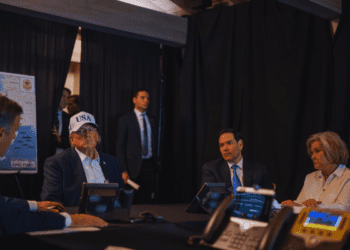With the latest premiers meeting wrapping up, relations between the federal government and the provinces are set to once again reach the forefront of the policy debate.
The Macdonald-Laurier Institute has established a reservoir of research on how Ottawa should approach its relations with the premiers on interprovincial trade, health care and infrastructure.
Interprovincial trade at the premiers meeting
The interprovincial trade issue has, once again, hit the headlines.
Earlier this month the federal government signaled that it would no longer accept the provinces’ inertia on the issue.
The Macdonald-Laurier Institute has long maintained that barriers to trade between the provinces will remain as high as ever until Ottawa steps in and gets tough with the premiers.
The provinces adopted the Agreement on Internal Trade in 1994. But in the past 20 years it has failed to lower barriers between the provinces.
The federal government announced recently that it wants the premiers to reform the AIT or scrap it entirely and replace it with a more effective document.
MLI Managing Director Brian Lee Crowley says the federal effort is encouraging but believes its impact will depend on the government’s willingness to push the agenda forward.
A paper Crowley co-authored, titled “Citizen of One, Citizen of the Whole”, explained why a charter of economic rights is the best way to deal with the interprovincial trade issue.
Crowley also wrote an op-ed for the Globe earlier this year explaining why the provincial efforts to lower barriers will continue to flounder without leadership from the federal government.
Health care
Costs for health care are consuming an ever-increasing portion of provincial budgets – and premiers are looking to Ottawa for help with the bill.
But is more money the answer to ballooning health care costs?
Crowley says no.
For years, the Institute has made the case that cutting the provinces a larger cheque is providing little incentive to innovate.
Instead, Ottawa should trade lower transfer payments to the provinces for greater freedom in how they respond to challenges in the health care field.
“We make a mistake when we seek the kind of federal leadership that concentrates on imposing a one-size fits all solution to our health care sustainability problem or that simply throws money at the problem and relieves those responsible of the need to think more carefully about reform”, wrote Crowley in an MLI commentary published earlier this year.
He says the welfare reforms Ottawa adopted in the 1990s should be used as a benchmark. That’s when the federal government reduced transfer payments and allowed the provinces to experiment with reforms that suited them best.
Infrastructure
Addressing the so-called “infrastructure deficit” is always top of mind at the premiers’ meetings.
Provinces and municipal governments often can’t afford to repair crumbling bridges and sidewalks on their own, so they look to the federal government for cash.
Crowley believes that Ottawa should be attaching more strings to the millions of dollars it annually sends local governments for infrastructure.
The federal government should make infrastructure money contingent on local governments properly accounting for the full cost of having to replace roads, bridges and sewers.
The current system rewards neglect, he says, since governments that don’t allocate money for repairs can boast about lower spending on a year-over-year basis.
He also wants to see local governments tap new revenue streams that force citizens who use infrastructure to pay for its upkeep, such as through user fees or local taxes.
“That way, when the current building spree reaches the end of its useful life, provision for the next generation will already have been made and arm-wrestling with Ottawa, at least over infrastructure, will be a thing of the past”, he wrote in a column for the Globe and Mail.




